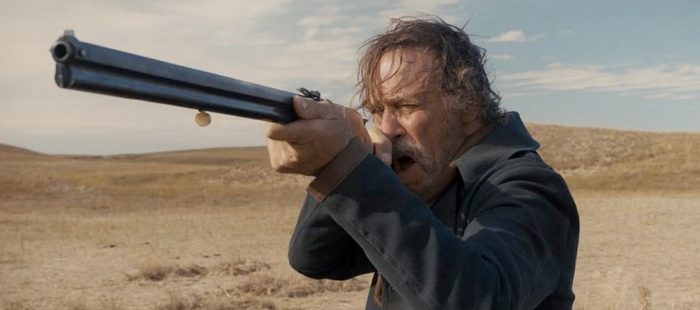'The Ballad Of Buster Scruggs' Showcases The Wide-Ranging Brilliance Of The Coen Brothers [NYFF]
It can be tough to take the Coen Brothers at their word – after all, the duo claims (seemingly in jest) that they never read Homer's The Odyssey despite basing O Brother, Where Art Thou? on it. But if they were forthright about the origins of their latest work, the anthology film The Ballad of Buster Scruggs, then it serves as a kind of career compendium. They wrote the film's first segment, a comedic musical western, decades ago when their work had a more overtly comical bent. They wrote the final segment, on the other hand, just before starting production on the film in order to put an adequate bow on the project.
The Ballad of Buster Scruggs functions like a greatest hits album for the Coens, though somehow with songs we've never heard before. It spans and encompasses the many styles of filmmaking they mastered over decades behind the camera. Their expert wielding of tone and mood has rarely been so evident as it is within each yarn they tell, all from a book of stories complete with color plates.
There's a bit of dissonance between the tales, which is wont to occur with an anthology film. These omnibuses disrupt traditional notions of narrative progress with their shortened, heightened rhythms and repeated climaxes. And their very nature of story stacked on top of story practically begs for ranking, already a tendency that gets exacerbated every time there's a new entry to the vast, formidable Coens' canon. But a few things unite The Ballad of Buster Scruggs: sitting ducks who are better prepared than expected, people left for dead who exhibit more resiliency than imagined and a sense of solitariness at odds with the wide, open terrain.
The film starts off with a bang in the titular tale, featuring Tim Blake Nelson as a crooning outlaw with a real sharp shot. Wanted posters label him "The Misanthrope," ironic given that he's by far the most gregarious character in the film. His lines and maneuvers drew uproarious laughter and even applause from a packed house at the New York Film Festival. The sugar rush continues into a second section, "Near Algodones," featuring James Franco as a bank robber narrowly and hilariously evading hanging from a noose. Most viewers will probably watch the film, a Netflix original, from the comfort of their own home; while the reaction will likely be less vocal, it will certainly provide an instant hook to sustain through some of the film's more inscrutable sections.
The more spirited interplay of beloved genre archetypes gives way to moodier, more interior western in Liam Neeson's section of the film, "Meal Ticket." He's still a familiar figure, the brooding wanderer, mounting a traveling show with a limbless orator who recites everything from Shakespearean sonnets to the Gettysburg Address. The vignette settles comfortably into his sad routine: set up the stage, pass around the hat for donations, move onto the next town. For all the possibilities traditionally associated with the Wild West, the Coens drill down and repeatedly illustrate the circular mundanity that draws quiet men further inward. It's the only section without clearly defined lines of good and evil or civilization and wilderness. The territory recalls A Serious Man in its opacity and willingness to frustrate. Anyone who finds themselves asking "why?" should keep in mind the Coens are asking the same.

The solitude of this section segues cleanly into the next, "All Gold Canyon," which features Tom Waits as an isolated prospector digging for gold along a riverbank. Waits' nameless character proves far more entertaining to watch that Neeson's because, in order to keep his spirits up, he must entertain and amuse himself through the tedious work. His dogged, grizzled turn makes the isolation quite amusing, in fact. That isolation is but an illusion, however, as reality comes crashing in as it tends to in Coen Brothers films: inopportunely during a moment of hard-fought triumph.
Such cruel irony is another key facet of the Coens' work, and nowhere does that have a stronger bite than in the next section, "The Gal Who Got Rattled." It may or may not be the longest in duration (I wasn't keeping a stopwatch on the stories), but this certainly feels like the centerpiece of The Ballad of Buster Scruggs, the purest distillation the Coens' aims and ends. Zoe Kazan does career-best work as Alice Longabaugh, a woman headed to Oregon who's frequently at the mercy of men to lead her way. Her trust in them to provide safety and security leads to love with Bill Heck's Billy Knapp, but that confidence comes with a cost further down the trail. The story is comedic, tragic, and dare I say ... oddly sincere for the Coens?
The whole enterprise caps off with "The Mortal Remains," less a story than a statement of purpose for the Coens. On a stagecoach speeding through the West, a diverse group of passengers becomes subject to a grandiloquent English bounty hunter (Jonjo O'Neill), who claims he ensnared his targets with storytelling. "You know the story, but people can't get enough of them," he observes, "so long as they can see themselves in them."
No story in The Ballad of Buster Scruggs is so familiar that we feel we know where it's going – the Coen Brothers directed it, after all. But the amount of opportunities for projection, identification and reflection serve as a reminder of their vast powers as storytellers and myth-makers. It is always a pleasure to watch Joel and Ethan Coen at work. American cinema has no one else like them.
/Film rating: 8 out of 10
